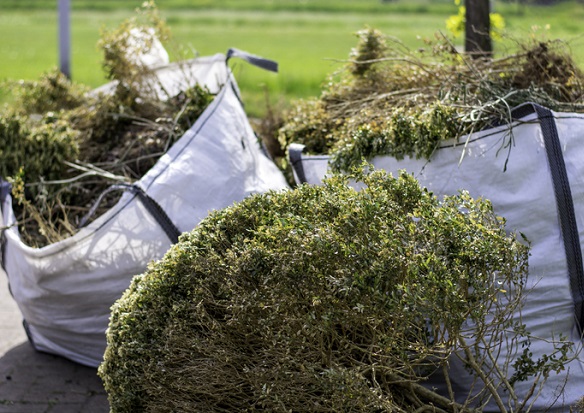Waste Recycling for Landscapers
Reading time: 4 minutes
Professional landscaping covers major work from creating attractive grounds for whole residential and commercial estates to maintaining large lawns and gardens. This generates a lot of organic waste that can’t always be easily disposed of, so you’re likely to need to collect this waste with the correct permissions. If you’re a professional organisation that needs to clear landscaping waste, you will need to be registered to collect such waste and have the right documentation handy. We’ll talk about that later.
What is considered garden waste?
Most garden waste is made of the kinds of things you might expect, such as grass cuttings, leaves, dead plants and pruned stems. However it can also cover other material such as extra compost or mulch, as well as old pots, seed trays and other garden bits and pieces that are no longer needed. This can include things that have been left in garden sheds that need a clear out with the rest of other unwanted rubbish.
Why is it important to dispose of garden waste properly?
It might seem unnecessary at first to have strict rules for all garden waste clearance, even smaller collections. The reason for this is potential concerns and risks around collection, storage and disposal. While some of these reasons seem extreme, in some parts of the country the knock on effects of these situations can potentially do a lot of harm.
- Flooding
- Fires
- Environment
What do you need to dispose of or recycle garden waste?
If you’re a gardener, landscaper or you’re hired privately to take away garden and landscaping waste, you will need a waste carrier's licence. If you’re requesting a collection from a third party, whether they’ve worked for you and agree to take the debris away, or someone else is taking it, there are likely to be further costs. Recycling and disposal can be a lengthy and complicated process.
Why do I need a waste carrier licence?
A waste carrier licence is essential for transporting waste on British highways if you fall into any of these categories:
-
Carrier – transporting waste
-
Dealer – disposes of waste, as well as buying and selling waste material
-
Broker – arranges for another party to dispose, buy or sell waste material
When you apply for a waste carrier licence, you need to consider which type of licence you need. You can apply for a top tier or lower tier licence.
- Top Tier Licence
- Lower Tier Licence
What is a waste transfer note?
In order to transport green waste for recycling or disposal, you will need to complete a waste transfer note for each consignment of waste you transport and drop off. It is considered part of your duty of care when it comes to waste management responsibilities.
The waste transfer note asks for essential information such as the type of waste, how it’s contained, some information on who’s transporting it, as well as other details. You should keep the note on file for two years should a representative of your local council wish to see it.
If this information has helped, we have more gardens and landscaping advice on Trade Corner. Check back regularly for hints and tips!
Disclaimer: The information contained on this page is intended as an overall introduction and is not intended as specific advice from a qualified professional. Travis Perkins aims to avoid, but accepts no liability, in the case that any information stated is out of date.




